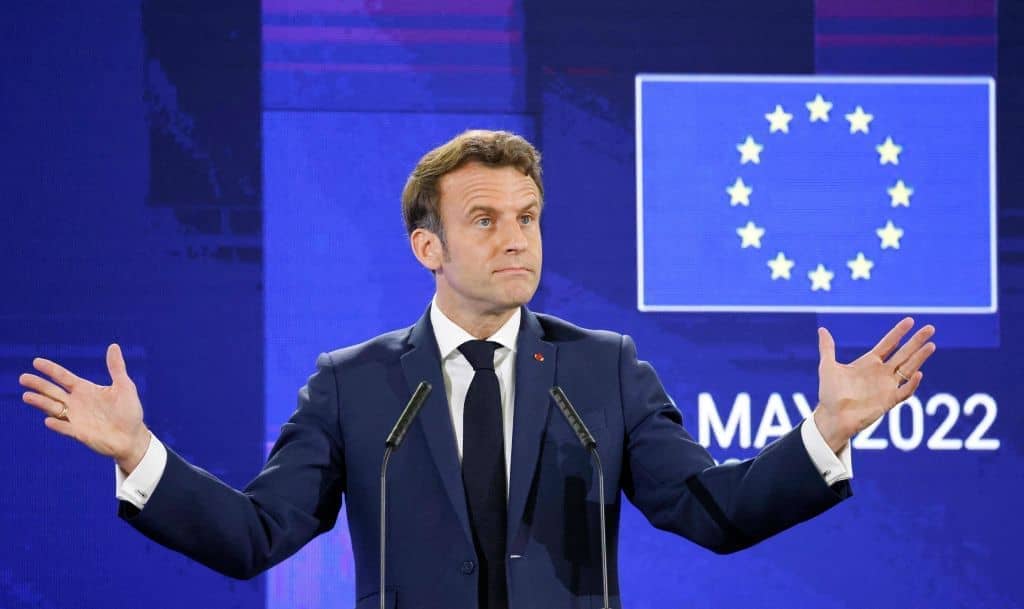Emmanuel Macron has taken it upon himself to tackle the delicate diplomatic situation of the war in Ukraine with fresh vigour following his victory last month. This week he addressed the EU parliament on the question of the future of Europe. France has the rotating presidency of the EU Council until June 30 and Macron therefore is the de facto head of the 27 member nations, a role for which his gargantuan ego is well suited.
The main takeaway from Macron’s address was the question of Ukraine’s application to join the EU. They began the process in February, days after Russia invaded, but any hope that president Volodymyr Zelensky had of his country being fast-tracked was quashed by Macron. ‘We all know perfectly well that the process to allow (Ukraine) to join would take several years indeed, probably several decades,’ he said. However, he did raise the possibility of Ukraine becoming a member of a ‘parallel European community’ in the interim.
This is classic Macron, what he himself admits is his ‘en meme temps’ (at the same time) philosophy. He first used it during the 2017 presidential election when he campaigned on a platform of being ‘neither left or right’. This was reflected in many of his proposed reforms which he promised would simultaneously do one thing as well as another. The cynic – certainly the British cynic – might describe this philosophy as fence sitting. This is an apt characterisation of his diplomatic efforts in trying to broker a peace deal between Russia and Ukraine.
Macron knows he can’t usurp Boris Johnson as Zelensky’s favourite western leader, so what other role remains open?
This is a role that Macron embraced with relish in February as Russian forces began massing on the Ukrainian border. The French president embarked on a round of shuttle diplomacy, visiting Zelensky in Kyiv and also Vladimir Putin in Moscow. Macron’s willingness to keep engaging with Putin after he had ordered his troops into Ukraine led some, notably Britain’s Defence Secretary Ben Wallace, to suggest that ‘there is a whiff of Munich in the air from some in the West’, a reference to the appeasement of Hitler in the late 1930s.
Macron has argued that trying to bring both sides to the negotiating table, even if it means keeping open communication channels with Putin, ‘is not evidence either of complacency or weakness’.
Nonetheless Macron did break off his diplomatic efforts with Putin last month when it dawned on him that his international grandstanding was having a negative effect on his presidential campaign. Once he had seen off the challenge of Marine Le Pen he resumed his hotline to Moscow.
He and Putin spoke on 3 May, their first conversation since March 29 but their eighth since the invasion of Ukraine on 24 February. Three days before he resumed his dialogue with Putin, Macron had spoken to Zelensky and promised to increase military and humanitarian support. And yet he is still to visit Kyiv since the outbreak of war, unlike Boris Johnson and a growing number of political leaders. The French media find this curious and for the last month the president’s advisors have batted away questions about when Macron might offer his unqualified support to Zelensky in person. On Monday his foreign minister, Jean-Yves Le Drian, mocked the idea of his president visiting Kyiv ‘just to say hello to president Zelensky’.
There will be an element of vanity to Macron’s reluctance to head east; he’s the sort of man who likes to blaze a trail, not follow in the footsteps of others, particularly if the footsteps are British. Macron knows he can’t usurp Boris Johnson as Zelensky’s favourite western leader, so what other role remains open?
That of peace-broker. Given Macron’s colossal conceit he may even harbour faint dreams of a trip to Oslo in the not too distant future to pick up a Peace Prize. On Monday he was once again invoking his ‘en meme temps’ approach, warning that the West must not treat Russia the way it did Germany after the First World War. ‘We will have a peace to build tomorrow, let us never forget that,’ Macron said, adding: ‘The end of the discussion and the negotiation will be set by Ukraine and Russia. But it will not be done in denial, nor in exclusion of each other, nor even in humiliation.’
The risk, however, in adopting such a stance against a leader like Putin is that Macron and not Russia will end up humiliated. Perhaps the pertinent historical reference at this moment is not Versailles in 1919, but Munich in 1938. British prime minister Neville Chamberlain was far more willing to trust Hitler than Édouard Daladier, the French premier. ‘Today it is the turn of Czechoslovakia,’ Daladier had warned in April 1938. ‘Tomorrow it will be the turn of Poland and Romania. When Germany has obtained the oil and wheat it needs, she will turn on the West.’
Shortly after giving his speech to the EU parliament, Macron embarked on his first overseas trip since his re-election. Perhaps inevitably, this was to Berlin for a meeting with German Chancellor Olaf Scholz. Few French leaders have been as Germanophile as the current resident of the Élysée, an attitude that is shared by many ministers in Macron’s government who, like their president, attended the École Nationale d’Administration (ENA).
Rare are the graduates from this finishing school for French technocrats, also located in Strasbourg, who emerge with anything other than unadulterated love for Germany and, by extension, the European Union. In paying Scholz the first visit of his new term in office, Macron will be hoping, amongst other things, to sweep him up and bring him onside in a unified approach to tackling the problem of Putin.
Chamberlain believed he knew better, just as Macron thinks today he is the sage of the West.







Comments